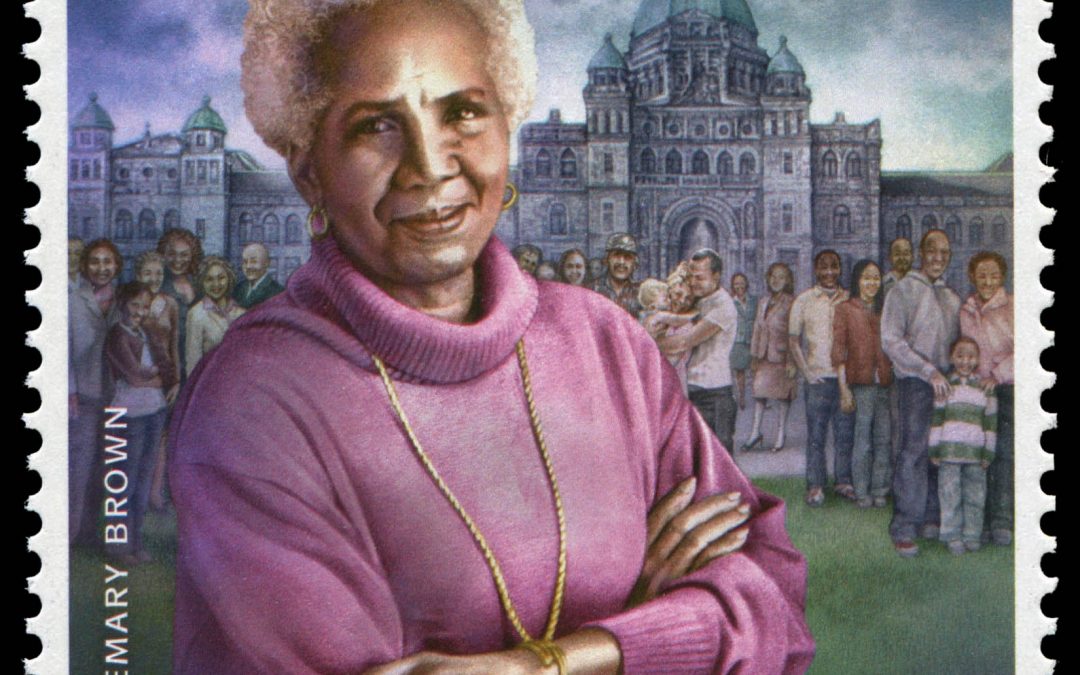“To be Black and female in a society which is both racist and sexist is to be in the unique
position of having nowhere to go but up.” – Rosemary Brown
Rosemary Brown (née Wedderburn) was born in Kingston, Jamaica, and came to Canada in 1951
to study social work, first at McGill University, then completing a Master’s degree in
social work at the University of British Columbia. Even as a young student new to Canada,
Brown experienced sexism and racism in her day-to-day life, including when seeking a job or
housing, and in life on campus.
After university, Brown helped to establish Voice of Women, the BC Association for the
Advancement of Coloured People and the Vancouver Status of Women Council. She also
worked with the Children’s Aid Society and was a counsellor at Simon Fraser University. Brown
appeared as a panelist on the Canada-wide CTV television series People in Conflict.
Brown entered provincial politics in 1972, winning her seat for the New Democratic Party
(NDP), thus becoming the first Black woman to sit in the BC Legislative Assembly, serving for
14 years. During her terms of office, she created a committee to remove sexist material from
British Columbia’s educational textbooks and curriculum, and she introduced legislation to ban
discrimination on the basis of sex or marital status.
In 1975, Brown ran for the leadership of the federal NDP, under the campaign slogan “Brown is
Beautiful.” In doing so, she became the first woman to run for leadership of a federal political
party. Boldly breaking colour barriers on the federal stage, Brown came a very close second to
Ed Broadbent, who led the Party from 1975 to 1989.
In 1986, Brown left politics to teach Women’s Studies at Simon Fraser University. In 1988, she
began to work in international advocacy, and for three years, headed MATCH International
Women’s Fund (now known as Equality Fund). Brown was tireless in her commitment to
MATCH, travelling the world, giving speeches, and building support for projects that promoted
the advancement of women in developing countries.
Brown’s autobiography, “Being Brown: A Very Public Life,” was published in 1990. In 1991,
Brown helped establish the Canadian Women’s Foundation, which advocates for gender
equality. From 1993 to 1996, Brown was chief commissioner of the Ontario Human Rights
Commission – a commitment she carried out while working with MATCH.
A truly inspiring Canadian, Brown was honoured for her work and achievements, both nationally
and internationally. This recognition includes 15 honorary doctorates from Canadian universities,
National Black Coalition Award (1972), the United Nations’ Human Rights Fellowship (1973),
the Order of British Columbia (1995), the Order of Canada (Officer, 1996) and the Government
of Jamaica Commander of the Order of Distinction (2001), to name just a few.
In 2004, the Rosemary Brown Award for Women was established, and is awarded annually to a
BC-based woman or organization that promotes Brown’s values and ideals. In February
2009, Canada Post issued a commemorative stamp to commemorate Rosemary Brown and her
amazing legacy in advancing equality and justice for all.
(Sources: The Canadian Encyclopedia; “100 More Canadian Heroines” by Merna Forster;
Simon Fraser University website)


Recent Comments